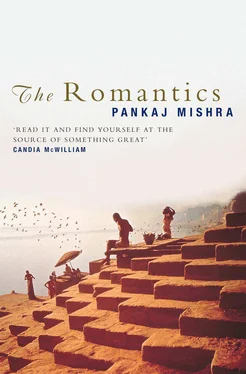Pankaj Mishra - The Romantics
Здесь есть возможность читать онлайн «Pankaj Mishra - The Romantics» весь текст электронной книги совершенно бесплатно (целиком полную версию без сокращений). В некоторых случаях можно слушать аудио, скачать через торрент в формате fb2 и присутствует краткое содержание. Год выпуска: 2001, Издательство: Anchor Books, Жанр: Современная проза, на английском языке. Описание произведения, (предисловие) а так же отзывы посетителей доступны на портале библиотеки ЛибКат.
- Название:The Romantics
- Автор:
- Издательство:Anchor Books
- Жанр:
- Год:2001
- ISBN:нет данных
- Рейтинг книги:4 / 5. Голосов: 1
-
Избранное:Добавить в избранное
- Отзывы:
-
Ваша оценка:
- 80
- 1
- 2
- 3
- 4
- 5
The Romantics: краткое содержание, описание и аннотация
Предлагаем к чтению аннотацию, описание, краткое содержание или предисловие (зависит от того, что написал сам автор книги «The Romantics»). Если вы не нашли необходимую информацию о книге — напишите в комментариях, мы постараемся отыскать её.
The Romantics — читать онлайн бесплатно полную книгу (весь текст) целиком
Ниже представлен текст книги, разбитый по страницам. Система сохранения места последней прочитанной страницы, позволяет с удобством читать онлайн бесплатно книгу «The Romantics», без необходимости каждый раз заново искать на чём Вы остановились. Поставьте закладку, и сможете в любой момент перейти на страницу, на которой закончили чтение.
Интервал:
Закладка:
I noticed the bag of pistols last, probably because it belonged so naturally to the room and the hostel, was so much a part of the broken furniture and the wild grass and the betel-juice stains. A couple of pistols were bulging out of a jute shoulder bag lying on the floor next to the green plastic bucket. I had seen the type before: ugly long-barrelled metallic pieces that came out of some dingy back room in the poorer parts of the city. They looked unreliable, and were indeed known to explode sometimes at the slightest bit of pressure on the trigger.
Vijay had told me that Rajesh was not into politics. I was less certain about what he actually did at the university. The pistols now made me wonder; they also made me nervous. I almost wished I hadn’t come.
Rajesh came back with the water and then proposed that we go out for tea. ‘There is no light,’ he said, gesturing to the naked lightbulb hanging at the end of a long electric cord tied to the ceiling. ‘No light all day today.’
It came to me that he wanted to get away from the room for another reason. Had this something to do with the pistols? But he had made no attempt to conceal them from me.
We walked through the deserted corridors to the rusty iron-barred gate, which had come loose from its hinges and furrowed the earth whenever it was moved. I asked Rajesh about the locked rooms. He said that most of the students had gone home after their ‘Mains’ — the main examination for the Civil Service.
He was silent for a while after this. But as we went through the gate and joined the tree-lined road leading to the tea stall, he asked me, ‘Are you planning to take the exam?’
I said I was, but I wasn’t twenty-one yet.
I needn’t have told Rajesh this, but the exam had been weighing on my mind for some time. It was partly why I had been sent to Allahabad University. It was why most people — at least in North India — went to university. In the past, the Civil Service — originally set up by the British — recruited large numbers of students from the universities of Allahabad and Benares. The number had diminished steeply in the last decade. But the old reputation had endured; these universities were still seen as portals to the Civil Service. Almost every student took the year-long three-tier exams at some stage; it was the thing to do whether or not anything in your academic record justified your ambitions. Though very exacting, they still offered the quickest route to affluence and power in North India. More important, they offered a way out of the hopelessness and desperation many of the students from nearby villages and towns knew awaited them at home. These students spent the best part of their twenties in their badly lit rooms, grappling with various exam ‘guides,’ memorizing whole essays on Gandhi and Nehru, cramming their heads with arcane statistics about the Indian economy. But only a handful of them ever qualified. To the rest, the results came every year as a fresh blow. They were the ones you saw age fast, with grey hair, crow’s feet and faltering eyesight; and every year there were at least four or five suicides.
*
At the tea stall — known to me from previous visits — the pot-bellied owner stopped pumping his kerosene stove as soon as he saw Rajesh and left his position behind the stall to come scurrying forward to greet him.
Rajesh seemed to take these attentions coolly, but I was struck by the man’s obsequiousness. Only a few days ago, I had seen him take a student by the scruff of his neck, after an argument that suddenly grew abusive, and send him tumbling out into the road to crash headlong into a terrified cyclist. Violence against students could invite immediate retaliation, but the actions of the stall owner suggested that he was indifferent to that possibility, that he was on good terms with the more aggressive elements within the student community.
With a wet rag he wiped a narrow wooden bench, placed it close to the stall crammed with kettles and glasses and motioned to us to sit on it. It was almost night now; the birds chattered loudly in the massive mango tree above us; mosquitoes danced around the petromax lamp on the stall.
Swathed in thick shawls and blankets, a few students appeared out of the dark. They saw Rajesh and came over to where we sat waiting for the tea to arrive. There was reverence in their attitude towards him; a couple of them even made as if to touch his feet but then flicked their hands across his knees instead.
Rajesh made no attempt to introduce them, but they all shook my hand and told me their names. From their accents and names, they appeared to be Brahmins from the rural districts near Benares, and were no different from the students that hung around Vijay in Allahabad, ‘studious’ boys from impoverished families, freshly arrived and vulnerable at the university and in urgent need of ‘backers’.
They began talking among themselves about an incident near the women’s hostel where an outsider had been caught molesting a woman student and was badly beaten up. I was sitting there listening when Rajesh turned to me and said, ‘You are here to study, is that right?’
I didn’t know what to say and gave a brief nod.
‘Then that is what you must do,’ he continued. ‘If anyone bothers you, let me know and I’ll fix the bastard.’
I couldn’t see his face in the dark, but he spoke in his normal voice, without emphasis. The moment quickly passed as someone turned to Rajesh to ask him his opinion of Rajiv Gandhi — the Bofors scandal had just hit the headlines then and made Gandhi, so far known as Mr Clean, suddenly seem corrupt and devious.
He didn’t say anything for a while, and when he spoke, he went on for a long time. He spoke not only of Rajiv Gandhi, who he thought was out of touch with Indian realities, but also of his mother, Indira, and then of Pandit Nehru. He was certain that the Nehru-Gandhi family had caused great damage to India. He said that Nehru wasn’t tough enough on corruption. A few sentences later, he said that circumstances had forced Nehru into being excessively accommodating. The speech was full of contradictions of that sort; he didn’t seem to have thought through many of his ideas. But the students listened attentively and he spoke slowly, drawing out his words with great deliberateness, eyes skimming over the faces around him. At times, he would open his palm to emphasize a point and would bring it down with a soft slap! on his thigh.
He stopped only when the tea came, in tiny tumblers, cardamom-scented, sweet, served by a small boy wearing an oversized threadbare jacket over a grimy vest. We drank in small sips, greedily inhaling the warm, scented fumes first.
The conversation turned to a student who, after just two years in the Civil Service, had accumulated millions of rupees in illegal commissions. Someone added, in a tone of amused awe, that he had also fetched a dowry of twelve million rupees.
Other such civil servants and large sums were mentioned; the students grew increasingly excited discussing them. The small boy in the threadbare jacket began to spray the scraggly ground with water from a leaking plastic mug. From the big transistor radio, encased in battered leather and hung from a nail in the trunk of the mango tree, came the baritone voice of the seven o’clock Hindi sports newsreader.
A few students passing by the tea stall noticed Rajesh and instinctively bowed their heads in greeting. Rajesh responded with a faint nod. I noticed all this and became even less sure of what to make of him. The admiration for Faiz, the pistols, the Godfather-like status, the monologue denouncing the Nehru — Gandhi dynasty — he had left a mixed impression on me. But it was hard to deny the sense of security his presence gave, and I felt I could disregard the rest. Sitting next to him that evening, among the only people I knew so far on the campus, I had felt myself safe for the first time in many days. The confusing bits about Rajesh, the parts that didn’t add up, didn’t seem to matter much at that point.
Читать дальшеИнтервал:
Закладка:
Похожие книги на «The Romantics»
Представляем Вашему вниманию похожие книги на «The Romantics» списком для выбора. Мы отобрали схожую по названию и смыслу литературу в надежде предоставить читателям больше вариантов отыскать новые, интересные, ещё непрочитанные произведения.
Обсуждение, отзывы о книге «The Romantics» и просто собственные мнения читателей. Оставьте ваши комментарии, напишите, что Вы думаете о произведении, его смысле или главных героях. Укажите что конкретно понравилось, а что нет, и почему Вы так считаете.












